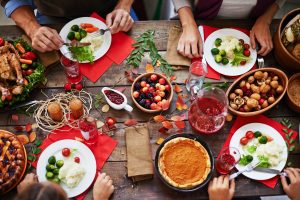Which Holiday Foods Should You Avoid If You Have Sleep Apnea?
November 19, 2018
 Sleep apnea affects an estimated 22 million people in the U.S. and can have serious consequences to their overall health. In fact, researchers have found a link between sleep apnea and many serious conditions like high blood pressure, depression, weight gain, and stroke. But even if you’re getting treatment for sleep apnea, you might not know that certain foods can aggravate it. With the holiday season upon us, keep reading to learn about which foods you can safely enjoy and which ones you should avoid!
Sleep apnea affects an estimated 22 million people in the U.S. and can have serious consequences to their overall health. In fact, researchers have found a link between sleep apnea and many serious conditions like high blood pressure, depression, weight gain, and stroke. But even if you’re getting treatment for sleep apnea, you might not know that certain foods can aggravate it. With the holiday season upon us, keep reading to learn about which foods you can safely enjoy and which ones you should avoid!
Which Foods Are Beneficial For People With Sleep Apnea?
Here are some great examples of holiday foods that can help ease your night of sleep and calm your symptoms:
- Foods high in omega-3 – If seafood is on the menu, feel free to enjoy it! Salmon, tuna, and even shrimp all contain omega-3 fatty acids that help your body produce melatonin, an important hormone that helps you get good-quality sleep.
- Fruits and vegetables that contain melatonin – Corn, asparagus, grapes, tomatoes, broccoli, cucumbers and cherries are all great sources of melatonin, so don’t be shy about second helpings.
- Foods that contain tryptophan – Tryptophan is a wonderful sleep-aid, and while turkey is the most well-known food that contains it, it’s not the only one. Chicken, beans, fish, nuts and many vegetables also contain good amounts of tryptophan.
Which Foods Should You Avoid?
Here are several foods that people with sleep apnea should avoid or minimize:
- High-fat dairy – Cheese, cream and full-fat milk are all examples of foods that can increase mucus production and make breathing more difficult. If eaten too frequently, these foods can also lead to weight gain, another risk factor for sleep apnea.
- Bananas – This one might surprise you, but bananas also increase the mucus production in your mouth and throat.
- Fatty meats – High in saturated fats, meats like steak, burgers, bacon, pork, lamb, and sausage can increase inflammation in the body and complicate cardiac conditions, which then exacerbates sleep apnea.
- Alcohol too close to bedtime – If you consume alcohol within a few hours of bedtime, the muscles in your throat become relaxed and more easily block your airway.
By combining good dietary choices with wearing your oral appliance each night, you’ll be able to better manage your sleep apnea so you can have a healthy and happy holiday season!
About the Author
With over 20 years of experience as a general and restorative dentist, Dr. J. Peter St. Clair is particularly interested in dental sleep medicine. Being a firm believer in the power of a good night’s sleep for overall quality of life, he enjoys educating his sleep apnea patients about good choices they can make at every time of year. If you have any other questions, he can be reached via his website or at (978) 948-2030.
No Comments
No comments yet.
RSS feed for comments on this post.
Sorry, the comment form is closed at this time.







